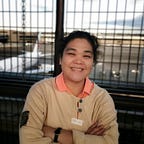How AI and Big Data Are Transforming Talent Acquisition and Organizational Development by Hiroko Sato
What comes to mind when you hear the term HR Technology? In today’s Industry 4.0 era, HR 4.0 has also become a popular topic of discussion. As far as we can remember, companies have been recruiting, training, evaluating, and hiring employees based on their experiences, instincts/feelings, and beliefs. However, is this process completely fair and accurate? Is this process taking much of a company’s time and resources?
In recent years, there has been an increasing need for organizations to develop technologies that would enable the workforce to perform well and become more productive. The HR industry now faces some challenging issues when it comes to recruiting diverse professionals — fresh graduates, executives, foreigners, etc. More and more professionals now look for a comfortable working environment that cater to their individual needs. And so, companies also see the need to adjust to each professional’s lifestyle and develop a culture that promotes more personnel engagement.
Last August 28, 2019, John Clements Consultants (JCCI) invited two guests from Institution for a Global Society Corporation (IGS) as breakfast forum speakers at the Manila House Private Club in Bonifacio Global City. Masahiro Fukuhara (Founder & CEO) earned his PhD in Business Statistics at the University of Tsukuba, his MS in International Finance from HEC Paris, and his MBA from INSEAD. He founded IGS in 2010 and has since developed a range of HR-Tech and Ed-Tech solutions named GROW. Fabien Roudier (Senior Manager, Overseas Business Department) earned his Masters degree in International Relations and Affairs at the AIX-Marseille University. He has an extensive experience of working in Asia, particularly in Cambodia, Vietnam, and Japan.
To formally start the forum, JCCI President & CEO Carol Dominguez delivered a short speech and shared that our Harvard Business Publishing team learned about IGS while perusing AI and Data Science case studies in the Harvard library. Carol then shared that IGS’s new AI HR Assessment tool, GROW360, is very convenient and can be easily accessed with the use of gadgets. She also stressed that this breakfast forum was special and was a perfect opportunity for the company to share cutting-edge technology in the field of HR AI/Data Science.
Following this, Mr. Fukuhara started his talk by sharing current developments in the field of AI. According to him, machines have the ability to achieve the thinking level of humans and will, in the not-so-distant future, be able to perform certain tasks as well as humans. Linking AI to business, he cited human’s unique nature, called Monty Hall problem, as a pitfall to decision-making and Bayesian statistics, a sort of prediction that uses probability. It was quite interesting to learn about these and connect human competency to machine technology. After this, Mr. Fukura discussed the three types of machine learning and deep learning, as well.
The next question was — is AI more capable of screening and choosing the right candidates than humans? This question made us ponder on human limitations, but also came to a realization that humans can never be taken out of the picture. Interestingly, a case study on Amazon’s talent screening showed that humans have many biases and unclear categories. In the end, Amazon concluded that a human-machine combination will work best. Before Mr. Fukuhara ended his talk, he shared the advantages brought about by digitalization in this highly competitive world. These include reducing data acquisition costs, increasing candidate quality, and improving time to hire metrics. In fact, according to IGS data, 90% of HR executives and managers agree that there is a need for digital HR tools; however, less than 9% have an understanding about it and only 8% have usable data.
The last session was about Data-Driven HR for Advanced Analytics by Using GROW360 Assessment. Fabien Roudier detailed the overview of the methodology, which uses psychometric assessment (5 personal traits) and behavioral assessment (25 competencies). He cited that having more data enables organizations to predict more precise results by AI. According to a case study on one Japanese company that had 8000 applicants for 500 positions, machine learning ensured continuous improvement in predictions, reaching 70% accuracy within three years, 25% increase in candidate quality and diversity, and 30% reduction in time to hire. This assessment enables an organization to analyze its core competencies and organizational weaknesses. It also finds the range of distribution between high and low-performing individuals within the organization.
After the two speakers had finished their talks, the floor was opened for the Q&A portion. It was such an informative and insightful morning and the attendees were excited to ask questions about the realities of AI/Data Science in the field of HR.
Come visit and join the John Clements Talent Community.
About the author:
Hiroko Sato is a graduate of Kyoritsu Women’s University with a Bachelor of Arts degree in English Literature. She also studied at the Arab Islamic Institute in Tokyo. Ms. Sato speaks three languages: Arabic, English, and Japanese.
